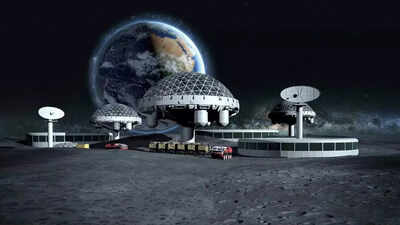The Moon may become the next data hub! What Jeff Bezos, Elon Musk and Sundar Pichai are planning for the future of AI
Tech billionaires are planning to build AI data centers in space and on the Moon as Earth’s energy grids struggle to meet computing demands. With AI’s electricity consumption skyrocketing, off-planet infrastructure is becoming a practical necessity rather than science fiction.
Key Takeaways
- Space-based data centers could solve AI’s massive energy and cooling challenges
- Major projects from Blue Origin, SpaceX, and Alphabet are already underway
- Lunar infrastructure could become viable within a decade according to experts
The Lunar Data Center Vision
Jeff Bezos recently called the Moon “a gift from the universe” for its potential as an AI infrastructure hub. His vision aligns with other tech leaders exploring space-based computing solutions.
Blue Origin and SpaceX are working to reduce space travel costs while Google has launched Project Suncatcher, a lunar computing initiative. Nvidia and startups like Starcloud are exploring space-based GPU farms, and Elon Musk is planning AI servers powered by solar-equipped Starlink satellites.
The Energy Crisis Driving Space Solutions
AI’s energy demands are already straining Earth’s resources. The United States has declared an energy emergency, warning that electrical grids need massive expansion.
Companies like xAI are using gas turbines temporarily for AI training, while OpenAI advocates for adding up to 100 gigawatts of new capacity annually. To put this in perspective, 1 gigawatt represents half the output of the Hoover Dam – and tech leaders now speak in terms of hundreds of gigawatts or even terawatts.
Space Advantages for AI Infrastructure
Space offers three critical advantages for future AI infrastructure:
- Unlimited Solar Energy: Above Earth’s atmosphere, sunlight is constant with no night, clouds, or weather disruptions
- Natural Cooling: Space’s vacuum naturally dissipates heat, solving one of Earth’s most expensive data center challenges
- Regulatory Freedom: No zoning disputes, environmental reviews, or local opposition that slow terrestrial expansion
Tech Leader Visions
Sundar Pichai sees the Moon hosting next-generation AI training modules. Elon Musk envisions a lunar digital backbone for Moon and Mars settlers. Jeff Bezos aims to extend Amazon Web Services into space-based cloud infrastructure.
Current Space AI Projects
Alphabet’s Project Suncatcher plans to launch two prototype satellites by 2027 to test machine-learning hardware in orbit. Sundar Pichai calls it a “complex engineering challenge” but essential for AI’s future.
Elon Musk proposes solar-powered Starlink satellites with high-speed lasers for data transfer, creating orbital data centers generating 100 gigawatts annually. His long-term vision includes Moon-based factories producing AI satellites harnessing 100 terawatts yearly, launched via electromagnetic catapults.
The race to build the first functional space data center is underway, marking what former NASA scientist Phil Metzger calls “the first real business case that will lead to many more” in space industrialization.




